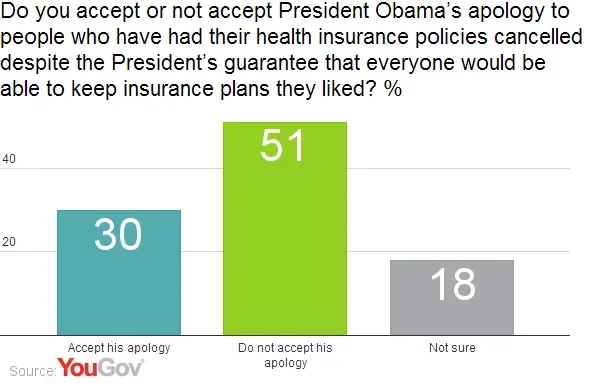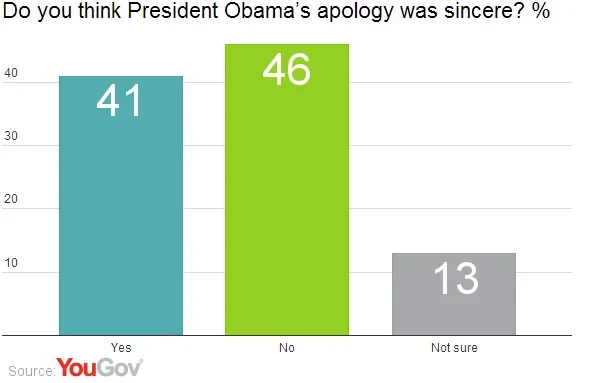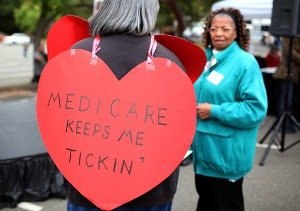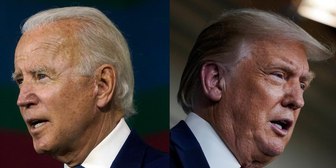Americans generally have very positive views of Medicare but are notably more skeptical of Obamacare, with most of those who say that they have been impacted by the new law believing that it has hurt them.
The American public continues to look on the Affordable Care Act (Obamacare) as a failure, but their belief in Medicare, the government-run health care package for those 65 and older, is so popular that many want to extend it to everyone, according to the latest Economist/YouGov Poll.
But the perceived success of that one government program hasn’t halted the rush to judgment on Obamacare. This week, two months before the law comes into effect for individuals, just about half call it a failure. Some – though not all -- are willing to wait a while before pronouncing final sentence.
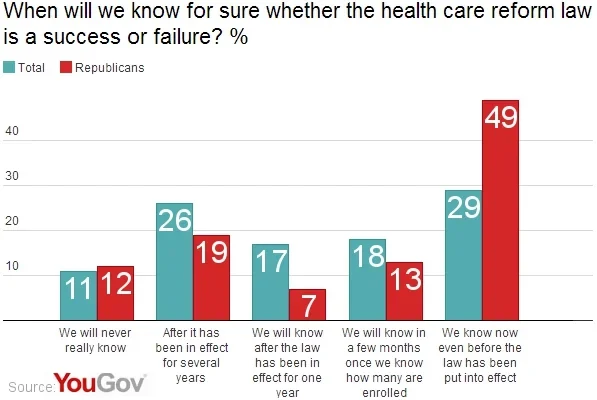
Nearly a third of the public say we know for sure now that the law is a success or failure – and that includes half of Republicans, most of whom (84%) currently judge the law to be a failure. Among the total public, just over half would give the law a year or so before passing final judgment, and some of them would put off judgment day indefinitely.
So far, however, a lot of Americans have nothing good to say about the law. Much of that response appears to come from expectations and partisanship, not any actual personal impact (since most Americans have yet to be affected). Just 24% say the law has personally affected them (with Republicans and Independents more likely than Democrats to think this). But most of those – 66% in fact – say the law has made their lives worse. 91% of affected Republicans think this – more than four times the percentage of affected Democrats who say their lives have been made worse because of the law.
There is a similar response when people are asked about the experiences close relatives may have had.
The biggest share of complaints had to do with costs, either premiums costing more or previous policies being cancelled, requiring searches for new coverage, or changes in the availability of doctors. Costs have always been a concern: more than half the public says they are very concerned about future health care costs.
The highly-publicized website problems don’t seem to be the cause of respondents’ evaluations of how the law has affected them, but there were plenty of complaints about them in the poll, mostly about the federal website, when those who said they had accessed it were asked about their experience. Those who attempted to access state exchange websites appeared to have a much easier time.
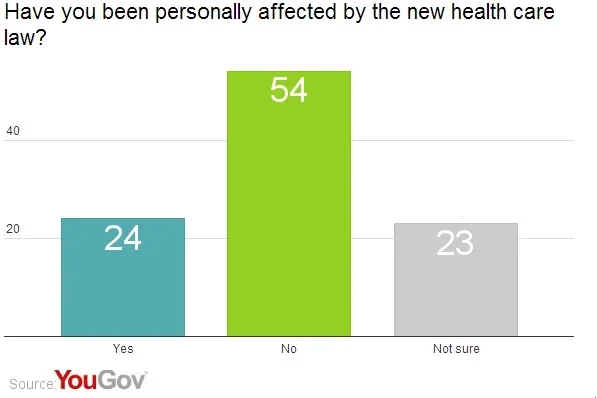
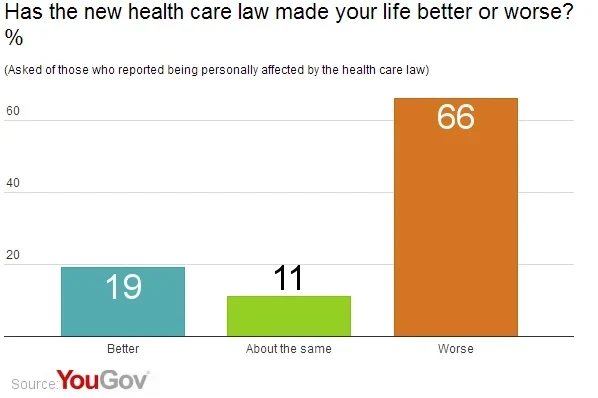
Looking ahead, 39% say they expect their own health care will be worse under the law; just 14% thinks their personal care will get better, and about a third see no change. There is more worry about costs than coverage.
If there is a lot of hand-wringing over the potential impact upcoming law, there is a lot of praise for one government-managed health care program. Three in four Americans say they know someone who is covered by Medicare. Nearly all of those 65 and over do. By more than two to one, opinion of Medicare is favorable. 80% of those 65 and older feel that way about the government program – it covers most of them personally. A majority of Republicans like the Medicare law, too, and by only a slightly smaller margin than the rest of the public. 56% of Republicans are favorable towards Medicare, 28% are not.
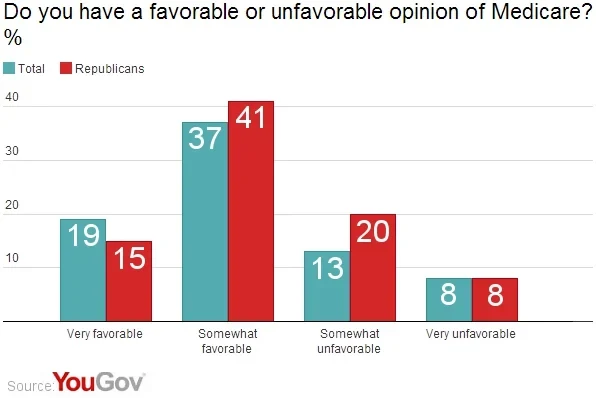
The positive assessment of Medicare means that many Americans would like access to it as their own primary medical coverage. A third would extend Medicare coverage to everyone, regardless of age. A third would oppose that.
Some of the usual partisan differences appear on this question: more than half of Democrats would extend the program to everyone, more than half of Republicans would not. But some of the most significant opposition to this type of change comes from those already benefiting from a program they like a lot – those 65 and older. Eight in ten senior citizens say they have a favorable opinion of Medicare, but more than six in ten oppose extending the program to all citizens, suggesting that many might be worried about a negative impact on their own benefits if the program is extended.
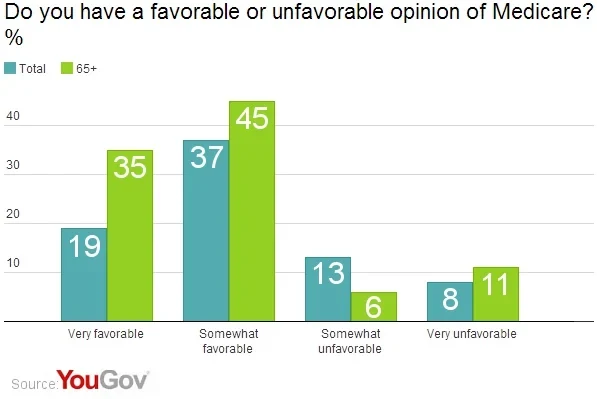
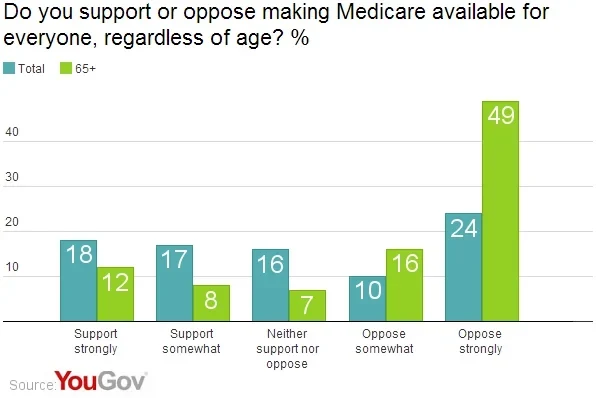
By 54% to 22%, senior citizens also oppose lowering the age of eligibility for Medicare to 60 from the current 65. That is something that the public overall would accept, though by a relatively smaller margin than its overall support for the program. 41% of the public favors lowering the eligibility age to 60, 27% oppose it. Support for lowering the eligibility age is especially popular with those who are next in line for Medicare: those between the ages of 45 and 64 favor lowering the age by two to one.
Only 10% overall (and the same percentage of senior citizens) would eliminate Medicare entirely. Fewer than one in five overall (and 32% of those 65 and older) would raise the eligibility age to 70.
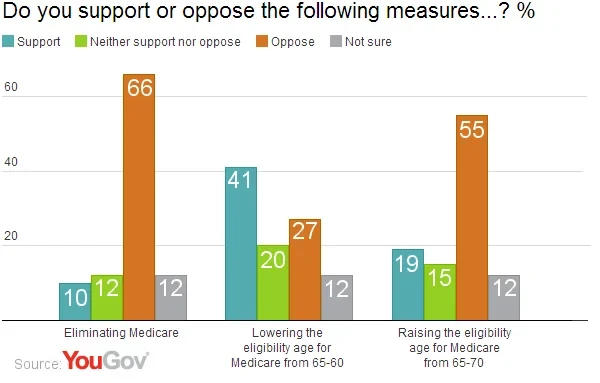
Medicare’s popularity hasn’t translated into support for the new law – or for the government’s implementation of the Affordable Care Act. More than half of senior citizen would repeal the legislation. And as the problems with healthcare.gov, the federal government’s insurance exchange website, continue and news about the cancellations of some individual coverage policies spreads (negating the President’s promise that no one who liked their existing coverage would lose it), many in the public doubt the sincerity of the President’s response. Half say they won’t accept the President’s apology for the cancellation of some policies, despite his promise that anyone who liked their current health care plan could keep it.
